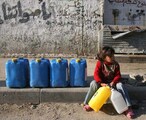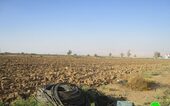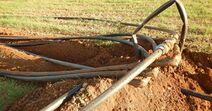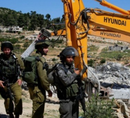10 mar 2020
|
|

Rakan Abed El Rahman for Middle East Eye
Experts say Israeli policies and wars are to blame for a deepening water crisis in Gaza that will have detrimental effects on public health, especially on the most vulnerable segment of society: children. [Transcript by Ali Salam] Ahmed Hills – Water and Environmental Expert “96% of Gaza’s residents rely on groundwater for their daily needs, including drinking water. More than 35% – 40% of the Gaza Strip’s sewage is not connected to a sewage system because of the Israeli blockade and the Palestinian political division. |
So, Gaza’s groundwater is exposed to pollution. Only 2% of Gaza’s groundwater is drinkable, and that does not cover people’s needs.
The valleys of the Gaza Strip are dry in general. Huge dams were built on its upstreams with a calculated capacity to block as much rainfall as possible, which would fall on all of Palestine and flow into the Gaza Strip. The Israeli occupation built the dams and rebuilt reservoirs next to them, filling up the reservoirs with the water it blocks.”
Khalid Al-Tibi – Director of Gaza’s Environmental Health Department
“The segment of society most affected by polluted water are children and the elderly. Polluted water can cause serious health problems, especially diarrhea, typhoid or paratyphoid, which is caused by salmonella microbes. All these diseases can develop in children when they drink polluted water.”
Monther Shublaq – Director of Coastal Municipalities Water Utility
“To improve the water situation in the Gaza Strip, step-by-step solutions must be found, such as small desalination plants, rainwater collection, wastewater treatment, seawater desalination and infrastructure like reservoirs and pipelines. Pollution form sewage has environmental, health and social effects. It also causes further degradation of the groundwater.
The most significant challenges that led to our water disasters have been the three Israeli wars on the Gaza Strip. The wars continuously destroyed all the reservoirs, wells and pipelines. Israel is not subject to any reliable system. Some projects have been delayed for four or five years. There was talk of bringing heavy equipment for the water authorities, such as drills, in order to maintain the pipeline, wells and networks.
This equipment was bought in 2015, so it’s been five years and this equipment is still at a storage unit in the West Bank.”
Ahmed Al-Hor – Water Vendor
“The percentage of people who can’t afford to buy water is between 80% to 90%. The situation is difficult. Sometimes, I know a customer does not have drinkable water, and I ask him if he wants to buy it, but he replies ‘no,’ because he doesn’t have money.”
Walid Badwan – Gaza Resident
“I fill my gallon containers with water from this street tap because I cannot afford to buy water at all. Water is essential for my home, but I cannot buy it. I walk long distances to get drinkable water. This is, of course, a burden on me and my children. Usually the tap water is cut off for half of the day. And when tap water is available, it is not good for drinking.”
Mohamed Abo Al-Kher – Gaza Resident
“Tap water causes diseases like kidney stones. Every month, when I have enough money, like 5 shekels ($1.50), I buy water. Sometimes I have to borrow money.”
Khalid Al-Tibi – Director of Gaza’s Environmental Health Department
“Private desalination plants remove salt and harmful chemicals from polluted water. Then the water is sterilised and sold to citizens for drinking. But this is a temporary solution, not a strategic one until we get our water rights from the Israeli occupation.”
Ahmed Hills – Water and Environmental Expert
“When water is drawn from wells or taken from desalination stations, it is exposed to different types of bacteria, viruses and parasites, especially during the distribution process.”
Khalid Al-Tibi – Director of Gaza’s Environmental Health Department
“Water [from private desalination plants] doesn’t meet the required health standards for human consumption. Calcium deficiencies lead to osteoporosis and lack of fluoride leads to tooth decay.”
Produced and Translated by Rakan Abed El Rahman
The valleys of the Gaza Strip are dry in general. Huge dams were built on its upstreams with a calculated capacity to block as much rainfall as possible, which would fall on all of Palestine and flow into the Gaza Strip. The Israeli occupation built the dams and rebuilt reservoirs next to them, filling up the reservoirs with the water it blocks.”
Khalid Al-Tibi – Director of Gaza’s Environmental Health Department
“The segment of society most affected by polluted water are children and the elderly. Polluted water can cause serious health problems, especially diarrhea, typhoid or paratyphoid, which is caused by salmonella microbes. All these diseases can develop in children when they drink polluted water.”
Monther Shublaq – Director of Coastal Municipalities Water Utility
“To improve the water situation in the Gaza Strip, step-by-step solutions must be found, such as small desalination plants, rainwater collection, wastewater treatment, seawater desalination and infrastructure like reservoirs and pipelines. Pollution form sewage has environmental, health and social effects. It also causes further degradation of the groundwater.
The most significant challenges that led to our water disasters have been the three Israeli wars on the Gaza Strip. The wars continuously destroyed all the reservoirs, wells and pipelines. Israel is not subject to any reliable system. Some projects have been delayed for four or five years. There was talk of bringing heavy equipment for the water authorities, such as drills, in order to maintain the pipeline, wells and networks.
This equipment was bought in 2015, so it’s been five years and this equipment is still at a storage unit in the West Bank.”
Ahmed Al-Hor – Water Vendor
“The percentage of people who can’t afford to buy water is between 80% to 90%. The situation is difficult. Sometimes, I know a customer does not have drinkable water, and I ask him if he wants to buy it, but he replies ‘no,’ because he doesn’t have money.”
Walid Badwan – Gaza Resident
“I fill my gallon containers with water from this street tap because I cannot afford to buy water at all. Water is essential for my home, but I cannot buy it. I walk long distances to get drinkable water. This is, of course, a burden on me and my children. Usually the tap water is cut off for half of the day. And when tap water is available, it is not good for drinking.”
Mohamed Abo Al-Kher – Gaza Resident
“Tap water causes diseases like kidney stones. Every month, when I have enough money, like 5 shekels ($1.50), I buy water. Sometimes I have to borrow money.”
Khalid Al-Tibi – Director of Gaza’s Environmental Health Department
“Private desalination plants remove salt and harmful chemicals from polluted water. Then the water is sterilised and sold to citizens for drinking. But this is a temporary solution, not a strategic one until we get our water rights from the Israeli occupation.”
Ahmed Hills – Water and Environmental Expert
“When water is drawn from wells or taken from desalination stations, it is exposed to different types of bacteria, viruses and parasites, especially during the distribution process.”
Khalid Al-Tibi – Director of Gaza’s Environmental Health Department
“Water [from private desalination plants] doesn’t meet the required health standards for human consumption. Calcium deficiencies lead to osteoporosis and lack of fluoride leads to tooth decay.”
Produced and Translated by Rakan Abed El Rahman
17 feb 2020

Israeli forces today destroyed couplings in pipes providing water to al-Shunah area of al-Jiftlik village, located in the Jordan Valley to the north of Jericho, according to Qais al-Sinawi, a local activist.
He told WAFA that Israeli forces raided the village and proceeded to destroy the connectors supplying running water to Palestinian crops.
Palestinians tend to install water connector to the main Israeli water carrier lines which supply between 400 and 700 cubic meters of underground Palestinian water per hour to the colonial settlements, which is for them the only way they can get water to their homes, crops and livestock as Israel bans them from building water pipes of their own.
Israel does not allow Palestinian development in the Jordan Valley, which its politicians have made it clear on several occasions that the fertile Jordan Valley would be annexed to Israel.
He told WAFA that Israeli forces raided the village and proceeded to destroy the connectors supplying running water to Palestinian crops.
Palestinians tend to install water connector to the main Israeli water carrier lines which supply between 400 and 700 cubic meters of underground Palestinian water per hour to the colonial settlements, which is for them the only way they can get water to their homes, crops and livestock as Israel bans them from building water pipes of their own.
Israel does not allow Palestinian development in the Jordan Valley, which its politicians have made it clear on several occasions that the fertile Jordan Valley would be annexed to Israel.
4 feb 2020

Israeli forces today destroyed pipelines that were supplying the northern Jordan Valley village of Bardala with irrigation water, according to Ziad Sawafta, deputy mayor of Bardala village council.
He told WAFA that Israeli forces regularly destroy the pipes supplying water for irrigation in Bardala, noting that the village suffers from water shortage due to Israel’s refusal to provide it with more than 100 cubic meters of water per hour when the needed amount is 240 cubic meters. video
He added that this harms the agricultural crops, which is the village’s main source of income.
He told WAFA that Israeli forces regularly destroy the pipes supplying water for irrigation in Bardala, noting that the village suffers from water shortage due to Israel’s refusal to provide it with more than 100 cubic meters of water per hour when the needed amount is 240 cubic meters. video
He added that this harms the agricultural crops, which is the village’s main source of income.
27 jan 2020

The Israeli authorities, on Sunday, demolished a water well in the village of al-Zawiyah in Salfit, central occupied West Bank, and delivered demolition notices to others.
The mayor of al-Zawiyah, Mohmoud Muqdadi, told Quds News Network (QNN) that “over 100 Israeli soldiers accompanied by bulldozers demolished a water well owned by Muath Musleh, and notified locals of the occupation state’s plans to demolish 10 other water wells.”
“The villagers gathered in the area, resulting in the prevention of the occupation forces from carrying out the demolitions,” added Muqdadi, stating that soldiers announced their plans to return to demolish the rest of the wells.
Muqdadi also stressed that “the local community will continue to protest, as they have done in the past, to prevent the occupation forces from demolishing water wells.” The villagers have organized protests that prevented the occupation authorities from building the apartheid wall on the village’s land.
“The locals of al-Zawiya, as well as the municipality, are determined to continue construction and cultivation in order to prevent the occupation state from confiscating it”, Muqdadi said.
“If they demolish a water well, we will build another,” he concluded.
Important to note that Resolution 64/292 of the United Nations General Assembly recognizes the human right to water and sanitation, and acknowledges that clean drinking water and sanitation are essential to the realisation of all human rights.
The mayor of al-Zawiyah, Mohmoud Muqdadi, told Quds News Network (QNN) that “over 100 Israeli soldiers accompanied by bulldozers demolished a water well owned by Muath Musleh, and notified locals of the occupation state’s plans to demolish 10 other water wells.”
“The villagers gathered in the area, resulting in the prevention of the occupation forces from carrying out the demolitions,” added Muqdadi, stating that soldiers announced their plans to return to demolish the rest of the wells.
Muqdadi also stressed that “the local community will continue to protest, as they have done in the past, to prevent the occupation forces from demolishing water wells.” The villagers have organized protests that prevented the occupation authorities from building the apartheid wall on the village’s land.
“The locals of al-Zawiya, as well as the municipality, are determined to continue construction and cultivation in order to prevent the occupation state from confiscating it”, Muqdadi said.
“If they demolish a water well, we will build another,” he concluded.
Important to note that Resolution 64/292 of the United Nations General Assembly recognizes the human right to water and sanitation, and acknowledges that clean drinking water and sanitation are essential to the realisation of all human rights.

Israeli forces destroyed a water collection well, on Sunday, in the Palestinian al–Zawiya village, west of Salfit, central occupied West Bank, the Palestinian News and Info Agency reported.
Head of al-Zawiyah village council, Mohmoud Muqdadi, said Israeli forces and bulldozers stormed the village and demolished the well, owned by a local Palestinian villager, for apparently lacking an Israeli ‘permit’.
Israel demolishes the homes of Palestinians for lacking a permit, while withholding permission to build at the same time, yet allowing illegal settlements to expand.
Israeli army destroys water well in Salfit
The Israeli occupation army on Sunday demolished a water well used for agricultural purposes and notified local residents of its intention to destroy 10 others in az-Zawiya town in the west of Salfit.
Az-Zawiya mayor Mahmoud Muqidi said that Israeli soldiers stormed Serisiya area in the town and sealed a well with dirt and rocks, adding that the well belonged to a local resident called Muadh Muslih.
The soldiers also notified local residents of intents to remove 10 other wells soon in the area.
In a separate incident, bulldozers belongings to Jewish settlers from the illegal West Bank settlement of Ariel razed a vast tract of fertile grazing and agricultural land in the north of Salfit. The land belongs to Palestinian farmers living in the area.
Local sources said that the Israeli occupation authority bulldozed the land in order to expand the settlement of Ariel.
Head of al-Zawiyah village council, Mohmoud Muqdadi, said Israeli forces and bulldozers stormed the village and demolished the well, owned by a local Palestinian villager, for apparently lacking an Israeli ‘permit’.
Israel demolishes the homes of Palestinians for lacking a permit, while withholding permission to build at the same time, yet allowing illegal settlements to expand.
Israeli army destroys water well in Salfit
The Israeli occupation army on Sunday demolished a water well used for agricultural purposes and notified local residents of its intention to destroy 10 others in az-Zawiya town in the west of Salfit.
Az-Zawiya mayor Mahmoud Muqidi said that Israeli soldiers stormed Serisiya area in the town and sealed a well with dirt and rocks, adding that the well belonged to a local resident called Muadh Muslih.
The soldiers also notified local residents of intents to remove 10 other wells soon in the area.
In a separate incident, bulldozers belongings to Jewish settlers from the illegal West Bank settlement of Ariel razed a vast tract of fertile grazing and agricultural land in the north of Salfit. The land belongs to Palestinian farmers living in the area.
Local sources said that the Israeli occupation authority bulldozed the land in order to expand the settlement of Ariel.
1 jan 2020

The Israeli occupation forces (IOF) on Wednesday morning took over five Palestinian-owned homes and a water pipeline in al-Mintar area in the Bedouin desert of east Jerusalem.
Chief of the Mintar land defense committee Younis Ja’far said that the seized homes belonged to five local residents, adding that the IOF also confiscated a plastic water pipeline in the area.
He also said that the IOF threatened to confiscate another long-distance pipeline in al-Sawahira area.
The IOF took this measure after Jewish settlers recently deployed prefabricated homes and water tanks in the area as a prelude to setting up a settlement outpost.
Chief of the Mintar land defense committee Younis Ja’far said that the seized homes belonged to five local residents, adding that the IOF also confiscated a plastic water pipeline in the area.
He also said that the IOF threatened to confiscate another long-distance pipeline in al-Sawahira area.
The IOF took this measure after Jewish settlers recently deployed prefabricated homes and water tanks in the area as a prelude to setting up a settlement outpost.
Page: 2 - 1
